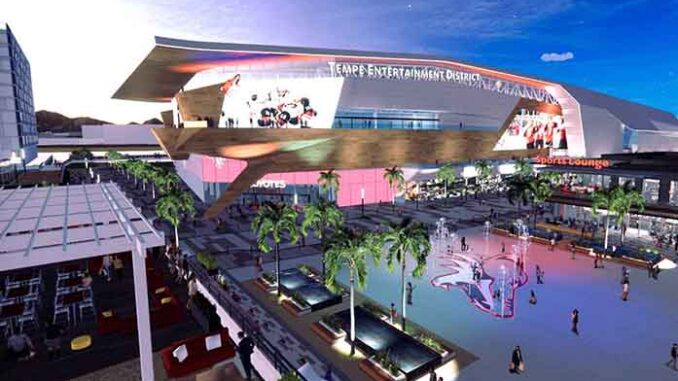
PHOENIX – The Arizona Coyotes’ development arm threatened Wednesday to sue Phoenix for interfering with plans for the team’s new home in a proposed Tempe Entertainment District, saying a Phoenix lawsuit “intentionally harmed” the developer.
Bluebird Development LLC’s “notice of claim” gave the city 60 days to drop a lawsuit that seeks to block the entertainment district – or “to settle this matter for $2.3 billion,” the damages Bluebird said it will suffer from the city’s suit.
Phoenix last week claimed in court papers that housing planned for the project would violate an agreement between the cities to prohibit residential development in an area subject to noise from Phoenix Sky Harbor International Airport, which the city owns.
Bluebird said the city’s suit broke an agreement that Sky Harbor would not oppose the proposed district, which is scheduled to go before Tempe voters next month in a special election.
The Sky Harbor suit alleges that when Tempe advanced plans for the development, it violated a 1994 intergovernmental agreement that addresses flight paths, noise concerns and land use surrounding the airport.
The agreement states that Tempe “will take such measures as are necessary to ensure that new development … in noise sensitive environs within its jurisdiction will be compatible with the noise levels predicted” in Federal Aviation Administration noise regulations.
That federal plan specifically notes that “the responsibility for determining the acceptable and permissible land uses and the relationship between specific properties and specific noise contours rests with the local authorities.” Though it does recommend against residences in the noise-affected area where the multifamily housing in the entertainment district would be built, it is permissible where the resulting buildings are soundproofed and “where the community determines that residential or school uses must be allowed.”
While on paper the legal fight centers around residential development, Coyotes President and CEO Xavier Gutierrez claims that Phoenix’s opposition derives from protecting economic interests.
“Phoenix City Hall’s bad behavior seems intended to preserve its downtown sports venue monopoly and has nothing to do with safety or soundness of the airport,” Gutierrez said in the press release announcing the claim.
In the release, the Coyotes pointed to comments by Phoenix Director of Aviation Services Chad Makovsky at a Nov. 29 Tempe special city council meeting as evidence of an agreement to not oppose the development.
“A positive and productive relationship between Tempe, Sky Harbor and the city of Phoenix has been and continues to be incredibly important to us. I wish you the best as you make this important decision for your community,” Makovsky said at the meeting, which entertainment district advocates have pointed to.
RELATED STORY: PACs go head-to-head before Tempe special election for Coyotes arena
In the same remarks, Makovsky also said, “I continue to object to adding the 1,995 residential units in the 1.2 square-mile-high noise contour.”
However, in a motion to dismiss the Sky Harbor lawsuit released along with the notice of claims letter, the Coyotes present a screenshot of the airport’s website after the special council meeting that reads, “Negotiations wrapped successfully with the developer prior to the Tempe City Council vote.”
Phoenix disputed Bluebird’s characterization that a deal had been reached, and said the developer should be frustrated with Tempe.”
“After a meeting with the mayors of both Tempe and Phoenix and two negotiations between the city managers of Tempe and Phoenix, we understood that Tempe was open to a reasonable compromise that would protect the airport, the communities around the airport, and allow these developments to proceed,” said a statement from Phoenix.
Beyond the legal battle, the fate of the entertainment district and arena lies in the hands of Tempe voters, who will decide on three ballot measures related to the project on May 16.
